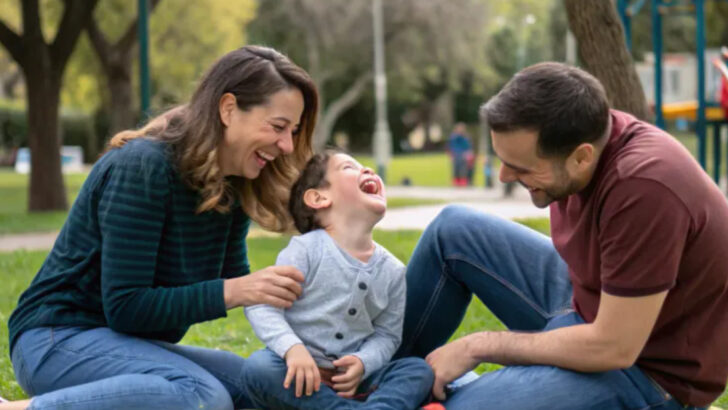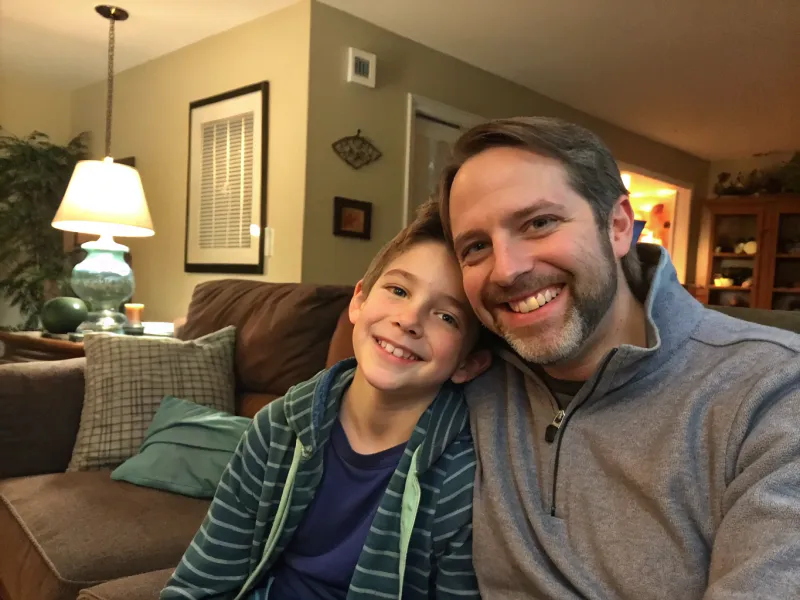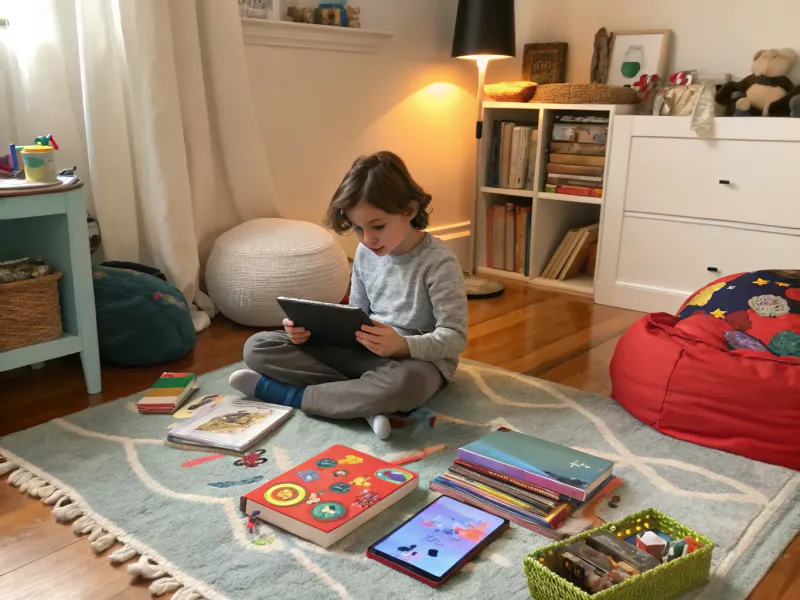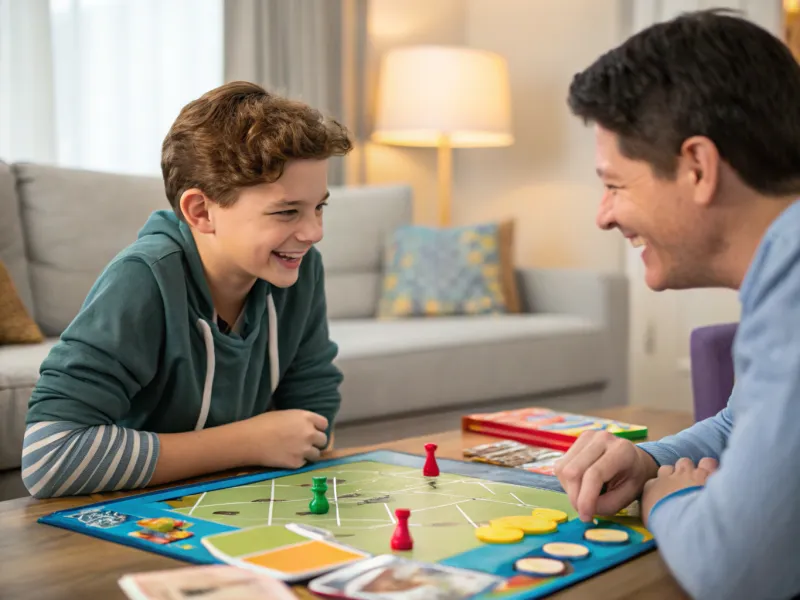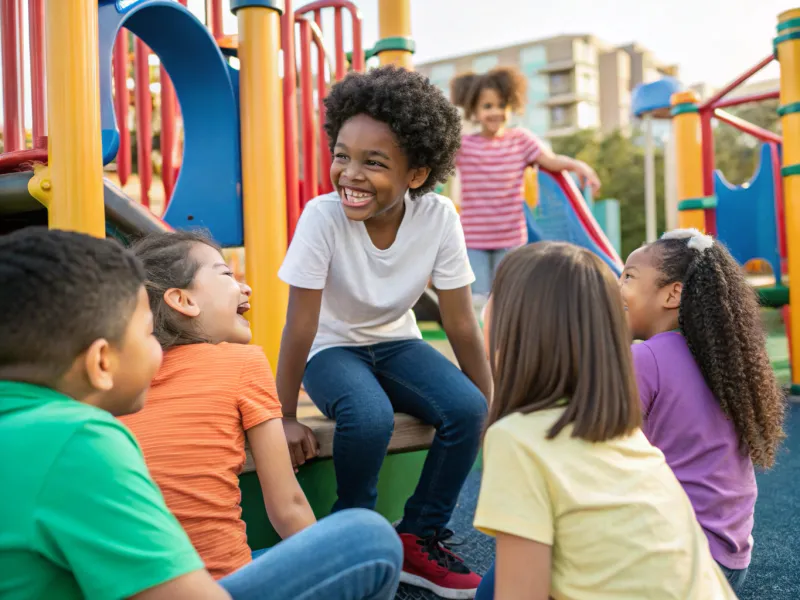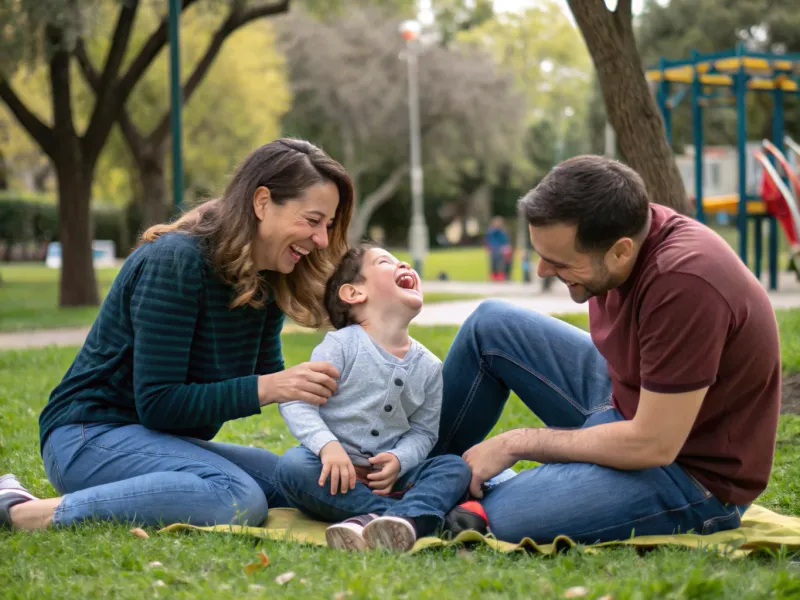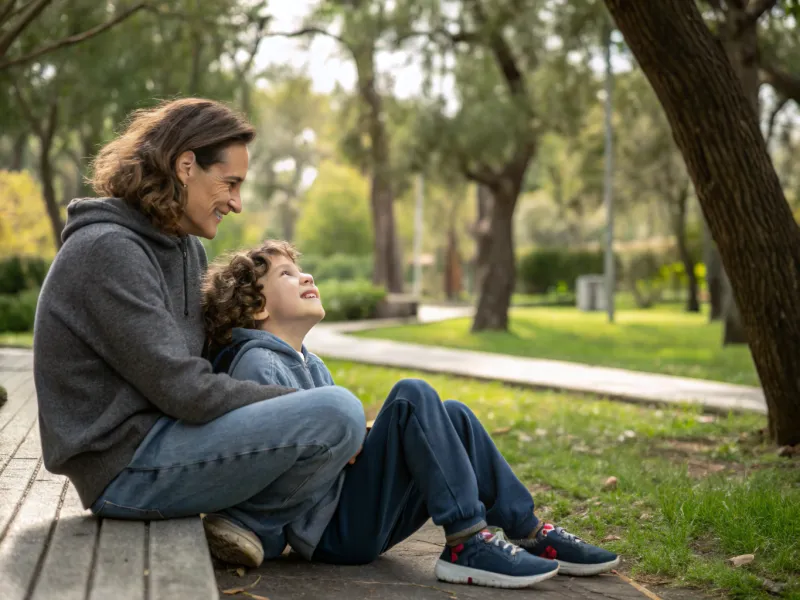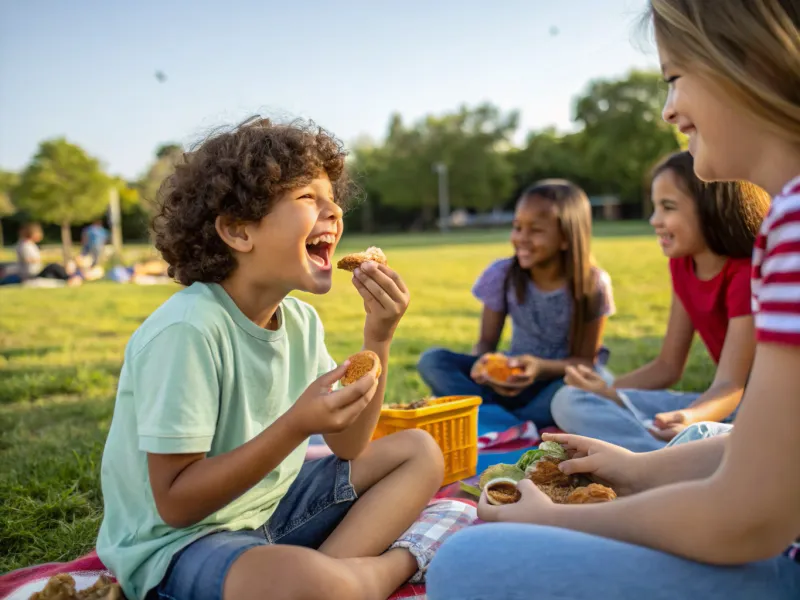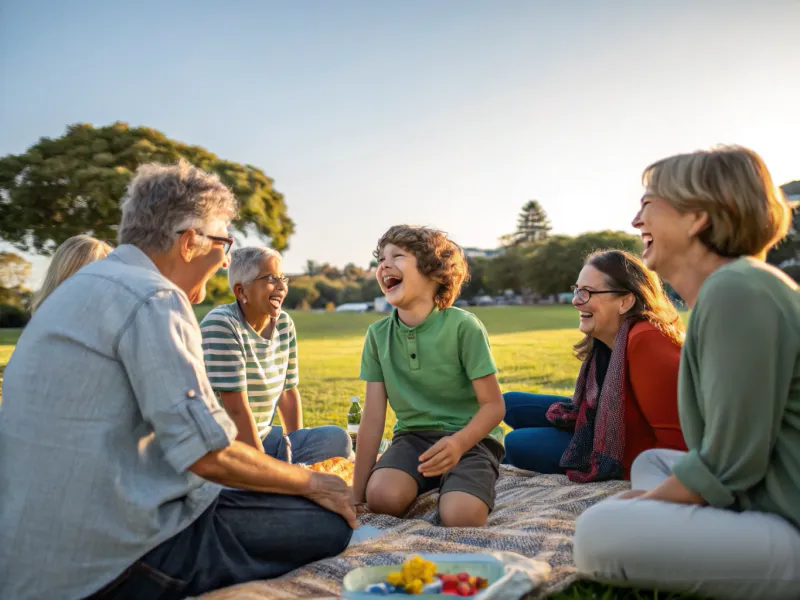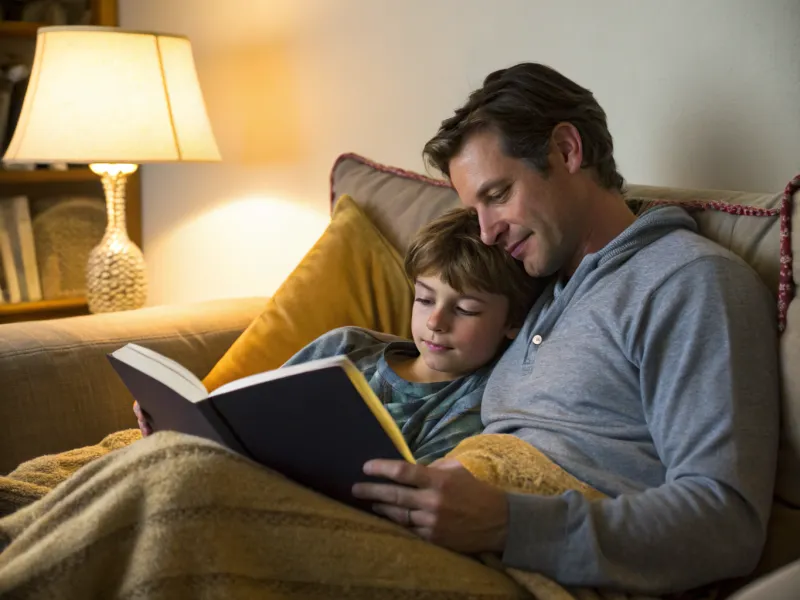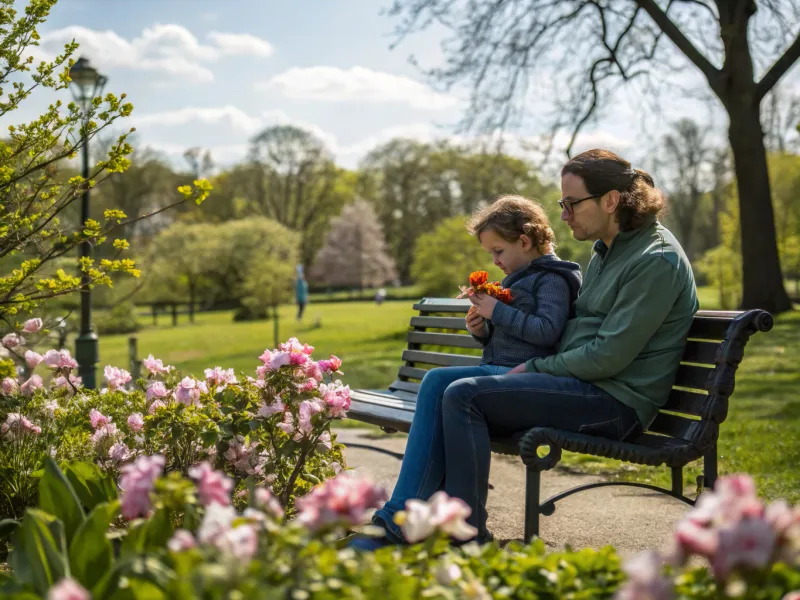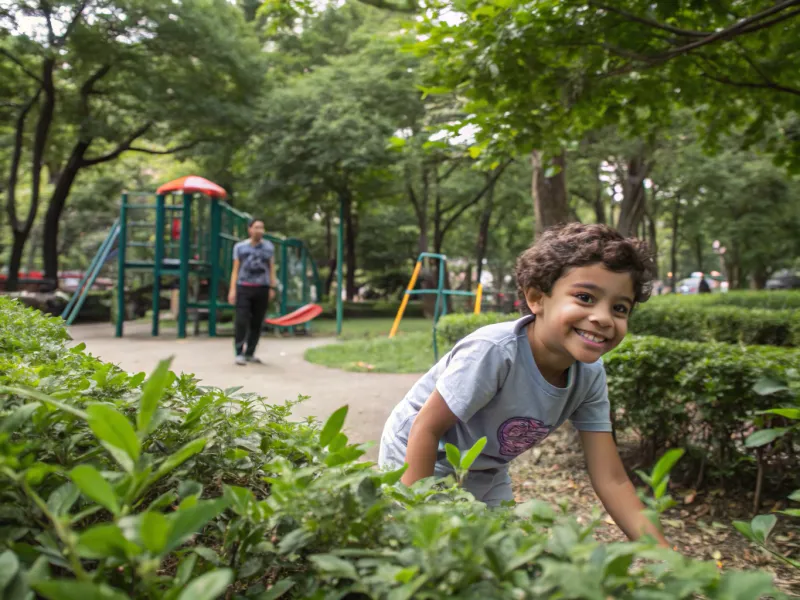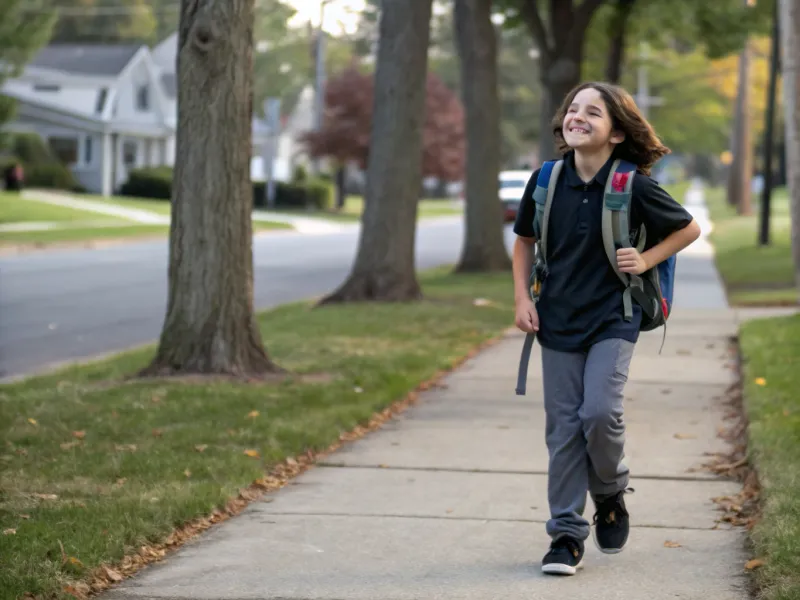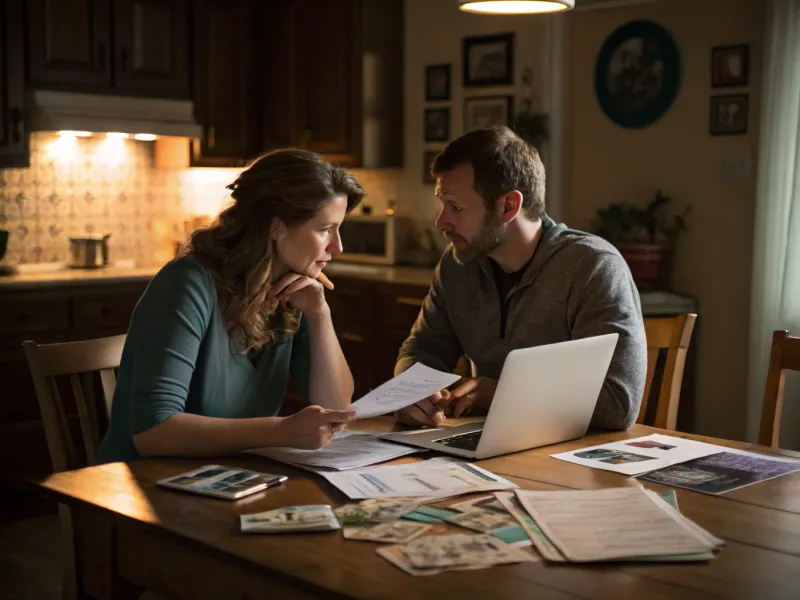Oh, the joys of parenthood! As a parent of an only child, you’ve likely heard it all—those well-intentioned but sometimes infuriating comments that make you want to roll your eyes so hard, they might just get stuck that way.
É como se ter um filho único nos tornasse um íman para conselhos não solicitados e suposições estranhas.
So, let’s dive into this cheeky list of 27 things you should never say to parents of only one child. Because sometimes, the best defense against ignorance is a good laugh and a clever comeback!
1. "Não se vão sentir sós?"
Solitário? Está a brincar? Só porque não há um irmão na fotografia, não significa que o meu filho esteja a viver num confinamento solitário. De facto, provavelmente têm mais encontros marcados para brincar do que eu alguma vez tive em criança. É que ser filho único não é uma sentença para uma vida de solidão. Eles têm amigos, primos e, possivelmente, mais tempo de qualidade com os pais - por isso, solidão? Aqui não é bem assim.
Curiosamente, este pressuposto de que um filho único está condenado a uma vida de solidão não tem em conta os círculos sociais vibrantes que muitas vezes constroem. As crianças são incrivelmente adaptáveis e socializam de formas que muitas vezes nos surpreendem a nós, adultos. Aprendem a fazer amigos rapidamente e a manter essas relações.
E não esqueçamos as inúmeras actividades que envolvem os seus interesses. Quer se trate de desporto, artes ou qualquer outro passatempo, eles encontram formas de se relacionarem com os seus pares. Por isso, da próxima vez que se sentir tentado a perguntar sobre a solidão, pense em todas as opções vibrantes de comunidade e companheirismo que eles têm. Acredite em mim, a vida social do meu filho está longe de ser estéril.
2. "Vais arrepender-te de não lhes ter dado um irmão."
Arrependimento? Essa é uma palavra pesada, não é? Quer dizer, não é que eu esteja a privar o meu filho de oxigénio. A decisão de ter um filho é muitas vezes uma escolha bem pensada, que equilibra considerações emocionais, financeiras e pessoais. Não se trata de um capricho irrefletido que levará a uma vida inteira de arrependimento.
Claro, os irmãos podem ser óptimos. Não vou negar isso. Mas há inúmeras famílias com vários filhos que não têm necessariamente relações de irmãos ao estilo da Disney. E aqui está um segredo: muitos pais de filhos únicos estão bastante satisfeitos com a dinâmica que têm. A ligação é algo de especial e não precisa de outro filho para estar completa.
Por isso, quando sugerem que me posso arrepender de não ter tido outro filho, talvez devam ter em conta que a felicidade de cada família é diferente. O arrependimento é uma emoção muito pessoal e assumir a sua presença é como olhar para uma bola de cristal que não temos. Acredita que eu sei o que é melhor para a minha família.
3. "Eles devem ser tão mimados!"
Talvez tenha confundido generosidade com indulgência. Só porque o meu filho não tem um irmão a competir pela atenção, não significa que seja inundado de presentes e privilégios sem controlo. De facto, o ensino da gratidão e da responsabilidade está no topo da agenda da nossa casa.
É certo que podem receber alguns presentes extra durante as férias ou aniversários, mas isso não equivale automaticamente a serem mimados. A partilha aprende-se através das interações sociais e não apenas por ter irmãos. Muitos filhos únicos crescem a compreender o valor do que têm e estão mais do que dispostos a partilhar com os amigos.
Por isso, da próxima vez que pensar em "mimado", pense talvez na educação equilibrada que muitos filhos únicos têm. Aprendem desde cedo que a vida não se resume a eles e, muitas vezes, desenvolvem fortes competências sociais que desafiam o estereótipo do mimado. O que está em causa são mais os valores incutidos pelos pais do que o número de crianças em casa.
Ver também: 31 Traits Of People Who Were Spoiled As Children According To Psychology
4. "Quem é que vai tomar conta de ti quando fores mais velho?"
Ah, a preocupação com o futuro prestador de cuidados - um clássico! É como se as pessoas pensassem que estamos a criar uma enfermeira em vez de uma criança. Sim, ter mais filhos pode aumentar as probabilidades de apoio mais tarde na vida, mas não é uma garantia. Muitas crianças com irmãos continuam a enfrentar estes desafios sozinhas ou com pouca ajuda.
Criar um filho com a expetativa de que ele será o meu futuro cuidador não é o plano. A minha estratégia de reforma não depende da sua futura morada. Além disso, existem inúmeras formas de planear a velhice que não implicam sobrecarregar os seus filhos.
Por isso, embora seja importante garantir que os nossos filhos são indivíduos compassivos e atenciosos, planear os cuidados futuros envolve muito mais do que simplesmente contar crianças. E, honestamente, é um pouco injusto sobrecarregar uma criança com esse tipo de expectativas. Vamos concentrar-nos em criá-los para serem felizes e auto-suficientes, antes de mais.
5. "Eles não estão aborrecidos em casa?"
A agenda dos meus filhos é provavelmente mais preenchida do que a minha. Entre projectos escolares, actividades extracurriculares e encontros para brincar, eles não estão de certeza a descansar no tédio. O verdadeiro desafio é manter-se a par da sua agenda agitada.
Atualmente, as crianças têm acesso a um fluxo interminável de oportunidades de entretenimento e aprendizagem. O mito de que só as crianças se sentam numa sala tranquila a jogar ao jogo do galo consigo próprias está ridiculamente ultrapassado. Elas estão tão empenhadas e entretidas como qualquer criança com irmãos.
6. "Eles vão sentir falta de ter alguém com quem lutar."
Oh, as disputas entre irmãos - o material das lendas familiares! Mas sejamos realistas, os conflitos podem ser sobrevalorizados. Claro que há lições de vida nessas batalhas, mas há inúmeras maneiras de um filho único aprender a negociar e a resolver conflitos.
O meu filho não está a perder nada de crucial por não ter um irmão com quem discutir. Eles têm desentendimentos na escola, com os amigos e até com os pais. Estas oportunidades ensinam-lhes a lidar com os conflitos de forma igualmente eficaz.
Além disso, a ausência de rivalidade entre irmãos significa muitas vezes um ambiente familiar mais pacífico. Por isso, quando alguém sugere que o meu filho está a perder por não ter um parceiro de luta incorporado, não posso deixar de sorrir. Eles estão a aprender a lidar com os desentendimentos do mundo muito bem, sem o drama dos irmãos.
7. "Dão-se bem com os outros?"
Ser filho único não vem com um autocolante que diz "socialmente estranho". De facto, muitos filhos únicos desenvolvem excelentes competências sociais precisamente porque se envolvem regularmente com pares fora da família.
Sem irmãos, tornam-se frequentemente hábeis a criar amizades e a manter esses laços. Aprendem a partilhar, a comunicar e a ter empatia com os amigos em vários contextos. A ideia de que teriam dificuldades a nível social é mais um mito do que uma realidade.
Por isso, fique descansado, o meu filho navega nas interações sociais com a mesma facilidade que qualquer criança com irmãos. Não estão isolados nem são incapazes de se relacionar com os outros. Em muitos casos, são borboletas sociais ágeis, passando de um amigo para outro com facilidade e charme.
8. "Não és um verdadeiro pai até teres pelo menos dois!"
Não é um pai a sério? Isso é de rir! Pelo que sei, ser pai ou mãe não se mede pela quantidade, mas sim pelo amor, pelos cuidados e pelas ocasionais noites sem dormir. Ter um filho não torna as minhas experiências menos válidas ou intensas.
A paternidade é uma viagem única para todos, e o número de filhos não é um distintivo de honra. Quer tenha um, dois ou dez, os desafios e triunfos dos pais são reais e profundamente sentidos. As noites sem dormir, os marcos históricos, as preocupações - são universais.
Quando alguém insinua que eu não sou um membro de pleno direito do clube dos pais, eu encaro isso com um grão de sal. O meu percurso como mãe é igualmente rico e gratificante, muito obrigada. O amor que tenho pelo meu filho não é diluído pelo seu estatuto de solteiro.
9. "Achas que estás a ser egoísta?"
A decisão de ter um filho tem muitas vezes origem numa tomada de decisão ponderada, considerando o que é melhor para a família como um todo. Não se trata de acumular amor ou recursos para si próprio.
Parents of one often focus on providing a well-rounded, stable environment, allocating resources for quality experiences, education, and personal growth. These are choices made with care and responsibility, not selfishness.
É fundamental compreender que cada família é diferente e que o que pode parecer egoísmo visto de fora é muitas vezes uma dinâmica familiar cuidadosamente equilibrada.
10. "Porque é que não tomas outro?"
Só mais um? Como se fosse tão simples como ir buscar mais um pacote de leite à loja. Ter mais um filho é uma decisão importante, que envolve finanças, mudanças de estilo de vida e disponibilidade pessoal.
Para muitos, a escolha de ter um filho baseia-se no que é viável e confortável. Não se trata de preguiça ou medo de se comprometer, mas de uma decisão consciente sobre a dinâmica familiar e os recursos. Mais nem sempre é melhor, especialmente quando se trata de criar uma família.
Embora ter vários filhos seja maravilhoso para muitos, um só não é um prémio de consolação. É uma questão de saber o que funciona para cada família, e essa é uma decisão que não deve ser tomada de ânimo leve.
11. "Não é triste para eles?"
Só porque o meu filho não tem um irmão, não significa que esteja a chafurdar na miséria. A vida está cheia de alegria, aventuras e ligações, e eles estão a vivê-la ao máximo.
Têm acesso a experiências ricas, amizades e interações familiares que enchem a sua vida de felicidade. A ideia de que não ter irmãos é sinónimo de tristeza está simplesmente ultrapassada. A vida não tem a ver com o número de irmãos, mas com a qualidade das relações e das experiências.
Além disso, as crianças são incrivelmente engenhosas. Encontram alegria nas coisas mais pequenas e o mundo é a sua ostra. Por isso, vamos acabar com este mito da "tristeza" e celebrar as vidas vibrantes que muitos filhos únicos levam.
12. "E se eles se tornarem egoístas?"
Os filhos únicos não são mais propensos ao egoísmo do que os que têm irmãos. De facto, muitas crianças desenvolvem uma forte empatia e generosidade através da convivência com diversos grupos sociais.
Os pais de filhos únicos ensinam frequentemente a partilha, a compaixão e o trabalho de equipa com intenção e concentração. Estes valores são incutidos nas interações quotidianas e não apenas na dinâmica entre irmãos. A ausência de irmãos não equivale a uma ausência de base moral.
13. "Eles devem ser tímidos ou introvertidos."
Estas caraterísticas têm pouco a ver com o facto de ser filho único e mais com a personalidade individual. Muitos filhos únicos são extrovertidos e confiantes, prosperando em ambientes sociais.
O facto de ser o único foco de atenção dos pais significa muitas vezes que são encorajados a expressar-se e a envolver-se socialmente. Aprendem a navegar eficazmente em diferentes grupos e contextos sociais, tornando-se frequentemente líderes nos seus círculos.
Cada criança é única e o seu comportamento social é moldado por muitos factores para além do número de irmãos. Não as classifique com base em estereótipos desactualizados.
14. "Eles nunca aprendem a partilhar, pois não?"
O meu filho tem isso como uma arte. O facto de não ter um irmão com quem trocar constantemente de brinquedos não significa que a partilha se torne inútil.
Muitos filhos únicos aprendem a partilhar através de brincadeiras, da escola e de actividades extracurriculares. Compreendem o valor da partilha e fazem-no frequentemente com entusiasmo, não com relutância. É uma competência social fundamental e, acredite, eles estão a dominá-la muito bem.
15. "Não é difícil para eles fazer amigos?"
Os filhos únicos são hábeis em formar e manter amizades, muitas vezes porque procuram ativamente ligações sociais fora da família.
Sem irmãos, desenvolvem frequentemente amizades fortes e profundas e aprendem a cultivar estas relações com cuidado. Envolvem-se em diversas actividades sociais, aperfeiçoando a sua capacidade de se relacionar com os outros.
Andam por aí a envolver-se, a estabelecer ligações e a construir amizades, tal como qualquer outro miúdo. E, muitas vezes, fazem-no com um toque que é todo seu.
16. "Eles não anseiam por um irmão?"
Claro que podem ter curiosidade em saber como é, mas não se trata de um desejo desesperado. Muitos filhos únicos estão satisfeitos com a dinâmica familiar que têm.
Criam relações significativas com amigos, primos e até animais de estimação, que preenchem as suas necessidades sociais e emocionais. A noção de que estão incompletos sem um irmão está ultrapassada e não reflecte a realidade das suas vidas felizes.
Por isso, embora se possam interrogar ocasionalmente, não é um vazio que os atormenta. Encontram alegria e satisfação nas relações que têm, e isso é o que realmente conta no seu mundo.
17. "Vais mudar de ideias em breve."
A escolha de ter um filho é muitas vezes uma decisão cuidadosamente ponderada, não uma fase passageira. Baseia-se no que funciona melhor para a nossa família, e não é provável que isso mude por capricho.
As circunstâncias da vida, as preferências pessoais e a dinâmica familiar desempenham um papel crucial nesta escolha. Não se trata de indecisão ou falta de empenhamento, mas sim de uma compreensão firme do que é correto para nós.
Por isso, embora a vida seja cheia de surpresas, esta decisão não é tomada de ânimo leve. Da próxima vez que previr uma mudança de opinião, lembre-se do processo cuidadoso que está por detrás da escolha de um filho. É uma decisão tão estável quanto intencional.
18. "Não gostariam de ter um companheiro de brincadeiras?"
Claro, mas isso não significa que precisem de um irmão para isso. O meu filho tem muitos amigos e companheiros de brincadeira que desempenham esse papel na perfeição.
O seu contacto com os colegas na escola, na vizinhança e durante as actividades garante-lhes interações sociais ricas. A necessidade de companheiros de brincadeira é satisfeita de várias formas que não envolvem um irmão.
Estão rodeados de amigos que tornam as suas brincadeiras animadas e gratificantes. Não é necessário um irmão para esse papel!
19. "Preocupa-te que não tenham apoio familiar?"
Um filho único goza frequentemente de uma rede forte e solidária de família alargada, amigos e comunidade.
O apoio familiar não se refere apenas aos irmãos, mas também às ligações e laços formados com os membros da família, amigos e mentores. O meu filho tem uma rede de apoio que é rica e estimulante.
Por isso, embora possam não ter irmãos, não deixam de ter apoio. São abraçados por uma família e uma comunidade amorosas que lhes dão a orientação e os cuidados de que necessitam. A ausência de irmãos não é sinónimo de falta de apoio.
20. "Não é cansativo para ti?"
A parentalidade é sempre uma mistura de cansaço e alegria, independentemente do número de filhos. Ter um filho não significa que a parentalidade seja menos exigente.
Gerir o trabalho, a casa e a parentalidade é um ato de equilíbrio, quer se tenha um filho ou mais. Os desafios únicos de educar um filho único trazem consigo o seu próprio tipo de exaustão, é certo, mas também recompensas únicas.
Um filho ou mais, é um trabalho de amor que é gratificante por si só. A exaustão é apenas uma parte do pacote.
21. "Sente-se pressionado a ter mais?"
Existe uma pressão social, mas não é algo que influencie as decisões da nossa família. A escolha de ter um filho é pessoal e feita com muita ponderação.
Embora os comentários bem-intencionados e as normas sociais possam sugerir o contrário, é importante concentrarmo-nos no que nos faz sentir bem. É isso que realmente importa no final.
Apesar da pressão, a decisão continua a basear-se na dinâmica e nas necessidades únicas da nossa família. Deixar que as pressões externas ditem as escolhas da nossa família não está na ordem do dia. A nossa atenção centra-se naquilo que traz felicidade e equilíbrio à nossa família.
22. "Estás preocupado com o futuro deles?"
Preocupado com o futuro? Naturalmente, mas não mais do que qualquer outro progenitor. Todos os pais querem o melhor para os seus filhos, e planear o futuro faz parte disso.
Having one child allows us to concentrate resources, attention, and planning on their future, ensuring they have the support they need. We focus on providing them with the tools and opportunities for a bright future.
Embora o futuro seja incerto, o nosso objetivo continua a ser o mesmo: preparar o nosso filho para o mundo que o espera. A preocupação é universal, mas também o é o amor e a preparação que dedicamos ao seu futuro.
23. "Não achas que eles vão ser superprotegidos?"
É um ato de equilíbrio, tal como com qualquer criança. Estamos atentos à linha ténue entre proteção e independência.
As crianças únicas podem, de facto, receber uma atenção mais concentrada, mas isso não significa que estejam enclausuradas. São encorajadas a explorar, a aprender e a crescer de forma autónoma, desenvolvendo a sua capacidade de resistência ao longo do caminho.
Trata-se de os guiar, não de os proteger de todos os obstáculos. Eles estão a aprender a navegar no mundo com confiança.
24. "Achas que vão ter dificuldades com a independência?"
Not really. Being an only child often means they learn to be self-reliant and independent from a young age.
Estão habituados a tomar decisões, a resolver problemas e a divertir-se sozinhos, o que promove a independência. Estas aptidões são aperfeiçoadas à medida que navegam sozinhas pelos desafios da vida. Aprendem a manter-se de pé com confiança e equilíbrio, prontos para enfrentar o mundo.
25. "Deves ter mais dinheiro para gastar."
Os pressupostos financeiros sobre as famílias com um filho podem ser enganadores. Embora possa parecer que ter um filho reduz as despesas, a realidade pode ser mais matizada.
Os pais podem optar por investir de forma diferente, por exemplo, afectando mais recursos à educação, a actividades extracurriculares ou a experiências familiares. As prioridades financeiras variam e ter um filho não equivale automaticamente a um excesso de recursos.
As famílias com um filho concentram-se frequentemente em proporcionar experiências de qualidade, o que pode implicar um compromisso financeiro significativo. É fundamental compreender que as situações financeiras são pessoais e diversas.
26. “Aren’t you worried they won’t know how to share attention?”
Spoiler alert: life is full of opportunities to practice patience and take turns. Whether it’s in the classroom, on the soccer field, or during family gatherings, my child isn’t growing up in a vacuum.
Just because they don’t have a sibling doesn’t mean they believe the world revolves around them. In fact, they’re learning how to navigate group dynamics and split attention like a pro.
So no, we’re not worried. They’ll be just fine when they’re not the center of the universe—because, surprise, they already know they’re not.
27. “Isn’t it unfair to them not to have a sibling to grow up with?”
Unfair? Let’s talk about fairness. What’s fair is giving a child a loving, supportive environment, regardless of how many siblings they have—or don’t have.
What some see as a missing sibling, we see as space for deeper connection, more individualized attention, and a calm(er) household dynamic. There’s no universal rulebook that says siblings equal happiness.
Only children grow up surrounded by love, friendships, and enriching experiences. They’re not being deprived—they’re simply living a different, equally beautiful kind of childhood.

